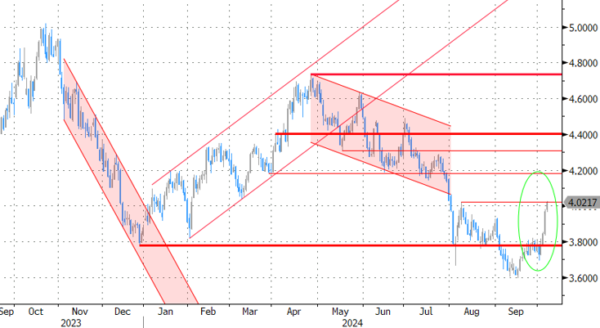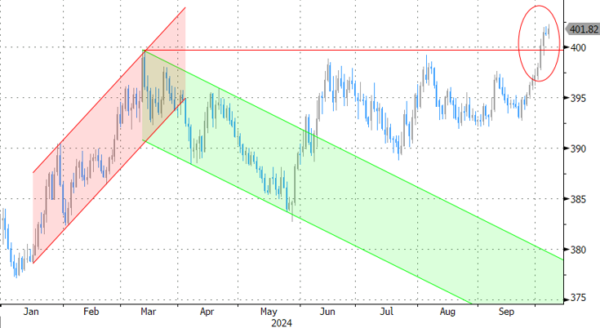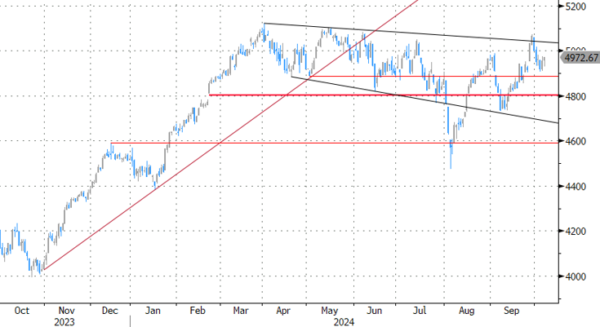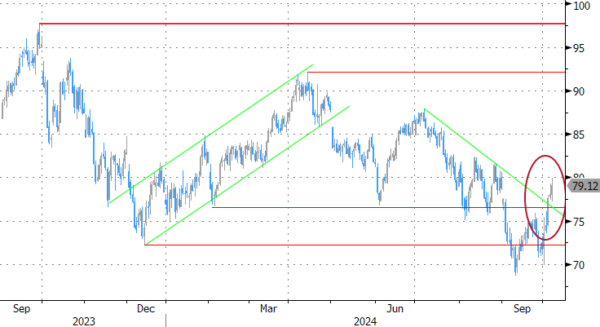[ad_1]
Markets
Friday’s blow-out payrolls still echoed through markets at the start of the new week. Core bond yields add several basis points again with US Treasuries underperforming German Bunds. US rates jump another 3.3 (30-yr) to 5.5 bps (2-yr). Net gains at the front end already total 30 bps in just two days. Several maturities take out (10-yr) or are intensively testing (2-yr) the psychologically important 4% barrier. US money market odds for a 50 bps Fed November cut evaporated completely and we think there’s little that Thursday’s US inflation numbers can change about that. Even a 25 bps move is no longer fully discounted (85%), suggesting some have started considering a skip. German yields were caught in the slipstream and eke out 2.4-3.6 bps across the curve. An ECB cut in October is still not fully priced in yet, even as ECB heavyweight Villeroy endorsed it overnight. UK yields long chased their US counterparts before taking the lead in early US dealings. Net daily changes vary between +4 bps (30-yr) to 6.7 bps (2-yr, at its highest since end June). Oil prices supported the yield rebound by testing the $80 barrel (Brent) for the first time since end-August on lingering geopolitical concerns. European stock markets erased earlier losses to trade a modest 0.3% higher (EuroStoxx50) throughout the session. US indices dip at the open. The more fragile risk environment compared to the no-landing narrative that drove the Friday gains is also obvious in currency markets. The Japanese yen and the Swiss franc outperform global peers while cyclical currencies (AUD, NZD …) lag behind. USD/JPY retreated to 148.04, EUR/CHF to 0.937. The dollar and the euro keep each other perfectly balanced around 1.098 support (March 2024 interim high, 38.2% retracement on the EUR/USD 2024 YtD low-to-high). Despite the solid UK gilt yield rise, sterling trades on the backfoot. EUR/GBP erases much of Friday’s drop but taking out the 0.84 lever is one step too far for the moment. A weak pound also dictates moves in cable. GBP/USD edged towards a new (early) October low of 1.308.
News & Views
After four months of lower than expected retail sales in Hungary, the Statistical office today reported a material beat for the month of August. The volume of sales rose by 0.8% M/M and 4.1% Y/Y (was 2.5% in July with analysts expecting 2.8% Y/Y). Sales both rose in food shops (7.5% Y/Y ) and non-food retailing (2.9%). Sales in automotive fuels declined 1.2%. The cumulative volume of sales over the January-August period was higher by 2.8% compared to last year. Beter than expected retail data might give some comfort after the economy in Q2 contracted by 0.2% Q.Q. Other data showed a further a rebound in the country’s trade surplus to €671m from €167m. However, this rise was due to the value of exports (-7.8% M/M) declining less than imports (-12.2%) M/M. Whatever, they weren’t able to change fortunes for the forint. At EUR/HUF 402, the forint trades at the weakest level against the euro since March of last year as higher US yields and a strong dollar are weighing on emerging market currencies. Forint weakness also reduces the maneuvering room of the MNB even as deputy -governor Virag at after the September policy meeting said that rate cuts might be on the table at every of the three remaining meetings this year.
According the UK Mortgage lender Halifax, UK house prices in September climbed for the third month in a row. A 0.3% M/M increase brought Y/Y-price growth to 4.7%, the highest rate since November 2022. This also brought the average property price (£293 399) only a whisker away from the record high reached in June 2022. In its assessment Halifax remains rather cautious. It states that ‘the increase is largely a recovery of lost ground. Looking back two years ago, price increased by just +0.4%.’ It nevertheless sees that market conditions have steadily improved over summer and into early autumn. Mortgage affordability has been easing thanks to strong wage growth. Halifax expects improved mortgage affordability to remain in place, but as housing costs remains a challenge form many, it expects property price growth to remain modest this and next year. Last week, BoE governor Bailey suggested more room for a more activist easing if inflation continues to decline, but US data end last week both pushed short-term (2-y and 10-y Gilt yield near 4.20%) well of the cycle lows reached in August and/or September.
Graphs
US 10-yr yield tests/takes out the 4% barrier as exceptional payrolls report still echoes through markets

Forint (EUR/HUF) suffers from tripple whammy: rebounding core bond yields, geopolitics and the EC taking the country to court

EuroStoxx50 looking for direction after Friday’s little boost fades

Oil prices briefly hit the $80 mark, further leaving behind the recent lows on a supply-driven rally

[ad_2]
Source link
Share this content:
